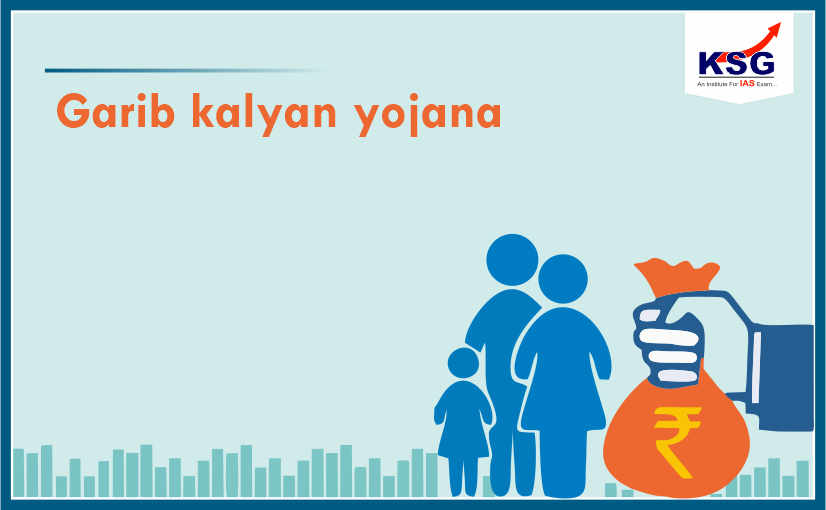PM Garib Kalyan Yojana (PMGKY)
Pradhan Mantri Garib Kalyan Yojna was launched in the year 2016 under Ministry of Finance. The scheme was valid from December 16, 2016, to March 31, 2017, and later was extended till 20,June 2020. A 1.70 lakh cr. relief packages to the underprivileged, poor and migrant workers affected by lockdown amidst COVID 19 crisis, was announced.

Pradhan Mantri Garib Kalyan Yojna was launched in the year 2016 under Ministry of Finance. The scheme was valid from December 16, 2016, to March 31, 2017, and later was extended till 20,June 2020. A 1.70 lakh cr. relief packages to the underprivileged, poor and migrant workers affected by lockdown amidst COVID 19 crisis, was announced. The package aims to provide the welfare of the poor who have been suffering because of the pandemic. The 'Garib Kalyan Rozgar Abhiyaan' will be implemented on a mission mode in 125 days in 116 districts of six states -- Bihar, Madhya Pradesh, Uttar Pradesh, Rajasthan, Jharkhand and Odisha -- that received the maximum numbers of migrant workers back.
FEATURES:
1) It will involve intensified and focused implementation of 25 different types of works to provide employment to migrant workers on one hand and create infrastructure in the rural regions of the country on the other, with a resource envelope of Rs 50,000 crore.
2) These 25 works are related to rural housing for the poor, plantations, provision of drinking water through Jal Jeevan Mission, and construction of panchayat bhavans, community toilets, rural mandis, rural roads, cattle sheds and anganwadi bhavans, according to the Ministry of Rural Development, which is the nodal ministry for the project.
3) The 25 schemes of the government will be brought together and would help build gram panchayat bhawans and aganwadi centres, assist in national highway works, railway works and water conservation projects among others.
4) This scheme will focus on durable rural infrastructure and providing modern facilities like Internet in the villages.
5) The Garib Kalyan Rozgar Abhiyaan was launched by Modi via video conference in a village in Khagaria district of Bihar in the presence of the chief ministers of five states -- Bihar, Madhya Pradesh, Uttar Pradesh, Rajasthan, Jharkhand -- and a minister from Odisha.
6) 12 different ministries/ departments such as Rural Development, Panchayati Raj, Road Transport and Highways, Mines, Drinking Water and Sanitation, Environment, Railways, Petroleum and Natural Gas, New and Renewable Energy, Border Roads, Telecom, and Agriculture, are involved.
PM Garib Kalyan Yojna has Two parts- Food security and Cash transfer.
Two silos of the scheme are:
PM Garib Kalyan Anna Yojna :
- To provide free source of 5kg wheat/rice in addition to 5kg that they already receive and 1kg of preferred pulses to ensure adequate availability of protein for the next three months for 80cr people under National Food Security Act.
Cash Transfer Scheme
- Insurance cover of Rs 50 lakh per healthcare worker for COVID-19. It covers Safai karamcharis, ward boys, nurses, ASHA worker, paramedics, technicians, doctors, and specialists and other health workers. All government health centers, wellness centers and hospitals of centre as well as states.
- Benefit farmers as 1st installment of Rs 2000 will be front loaded and paid under PM KISAN Yojna.
- 20 cr women Jan Dhan account holders to get Rs 500 per month for next 3 months.
- Gas cylinders free of cost would be provided to 8cr poor families for 3 months.
- For next 3 months the government proposes to pay 24% of the monthly wages into their PF account for wage earners below Rs 15000 per month in business having less than 100 workers.
- An ex-gratia of Rs 1000 to 3cr poor senior citizens, poor widows, poor disabled.
- MGNERGA wages would be increased by Rs 20 with effect from April 1, 2020.
- Self Help Group [SHG] would get from 10 to 20 lakh collateral free loans under Deen Dayal Upadhya National Rural Mission Scheme.
Other components of PM Garib Kalayaan Package are:
- Employees’ provident fund regulation would be amended to include pandemic as reason to allow non-refundable advance in organized sector.
- State governments to use the buildings and construction workers welfare fund to provide relief to construction workers.
- The state government would be asked to utilize District Mineral Fund [DMF] for preventing the spread of COVID 19 pandemic as well as treating the patients affected with the same.
The challenges faced are that certain sections of daily wage earners and informal workers who are not well connected with the financial and banking system may be left out. Migrant workers may face difficulties in accessing food grains. Cash transfers might not be sufficient once the income starts drying for vulnerable sections. With almost all economic activities suspended, government revenues will fall drastically mounting to huge fiscal pressure.
Still we have a way forward to deal with this issue. It should be tackled with rigorous measures to avoid economic repercussions. Financial resources of the states should be augmented to prevent the spread of COVID-19. Supply chains of essential commodities should be well maintained across the states. Ensuring easy access to credit would go a long way in benefiting farmers, manufactures and MSMEs.
